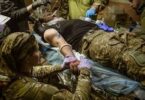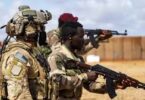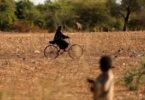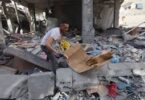KINSHASA (Reuters): An influential African bloc urged Democratic Republic of Congo on Sunday to recount the votes of its chaotic presidential election, raising pressure on Kinshasa to ensure the legitimacy of the next government and avert widespread violent unrest.
The Dec. 30 vote was supposed to mark Congo’s first uncontested democratic transfer of power in 59 years of restive independence, and the beginning of a new era after 18 years of chaotic rule by President Joseph Kabila.
But irregularities including faulty voting machines, poorly run polling stations and a halt in the vote for over a million people due to insecurity and an Ebola outbreak in the east, have overshadowed talk of democratic progress.
Sunday’s intervention by the Southern African Development Community (SADC), which contains regional allies of Kinshasa like South Africa and Angola, could push Kabila to tackle the presidential runner-up’s accusations that the vote was rigged. Second-place finisher Martin Fayulu said that he in fact won by a landslide and that the official winner, opposition leader Felix Tshisekedi, struck a deal with Kabila to be declared the victor. Tshisekedi and Kabila deny this.
Isolated post-election violence across the mineral-rich country of 80 million people that sprawls across central Africa has many fearing a return to the kind of civil war upheaval that has killed millions since the 1990s.
International pressure on Kabila has been building since the vote, in part because Congo’s influential Catholic Church said that tallies compiled by its 40,000-strong monitoring team show a different winner to those announced by the electoral commission, without saying who.
France, Belgium, the United States and Britain have all expressed concern about the vote.
But the SADC will hold greater sway in Congo. Its approval of the election’s results are critical for the legitimacy of president-elect Tshisekedi’s new government.
SADC previously said the election went “relatively well” despite some problems. But on Sunday it said it had taken note of the “strong doubts” cast on the poll by the Church.
“A recount would provide the necessary reassurance to both winners and losers,” an SADC statement said.
The Church’s bishops conference, known as CENCO, was not immediately available for comment on Sunday, nor were spokespeople for Kabila, Tshisekedi and Fayulu.
The 16-nation SADC also recommended a government of national unity including parties representing Kabila, Fayulu and Tshisekedi that could promote internal peace.
“SADC draws the attention of Congolese politicians to similar arrangements that were very successful in South Africa, Zimbabwe and Kenya (that created the) necessary stability for durable peace,” the statement said.
The chances of this kind of unity in Congo appear slim for now. Fayulu, who is backed by bitter political rivals of Kabila, on Saturday filed an election complaint with the Constitutional Court to have the result overturned. He has called for a hand recount of the votes.






